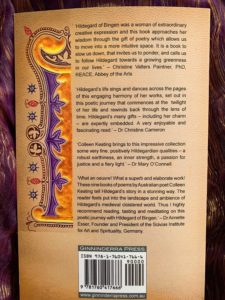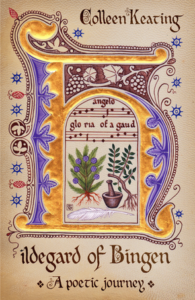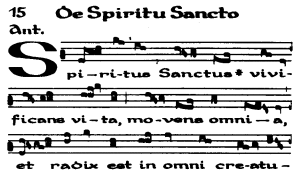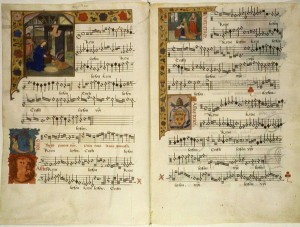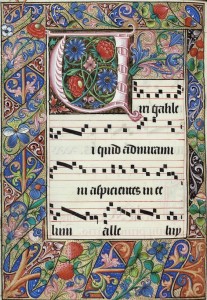Why is Hildegard of Bingen Important?
- Hildegard of Bingen produced major works of theology, music and medicine. Her work continues to influence our ways of thinking today.
- Hildegard is one of only 36 people to be named Doctor of the Church, a title given by the Roman Catholic Church to saints whose writings, research or study on theology or doctrine are useful to Christians “in any age of the Church.”
- Hildegard von Bingen changed the way we view the world. Among her most recognizable contributions is her theory of Viriditas, the divine force of nature.
- Hildegard was an early naturopath. She closely observed and documented human ailments and remedies. We have Hildegard of Bingen to thank for discovering many healing plants and natural remedies.
- Hildegard was an early nutritionist. She influenced the medieval diet popular today.
- Hildegard taught us how-to live-in moderation. She had a firm belief in routine, discipline, and discretio, the practice of living in balance and bringing the union of the divine and man into order.
- Hildegard of Bingen taught us that creativity is both an expression and form of prayer.
- Hildegard was one of the most important composers of the Medieval Period. Her morality play and opera, Ordo Virtutum, is the only Medieval composition surviving today with text and music.
Who was Hildegard of Bingen?
Canonized in 2012, Saint Hildegard of Bingen has long been recognized as a meaningful religious and historic figure. Born in 1098 to a noble family in Germany’s Rhine Valley this Benedictine abbess was a visionary and polymath, a poet, playwright, composer, philosopher, theologian, Christian mystic, scientist, and Doctor of Medicine.
What is Hildegard of Bingen Known for?
We appreciate Hildegard today as an extraordinary woman of the Middle Ages who held extremely progressive ideas for her time. Her irrepressible spirit and gifted intellect lifted her above the social, cultural and gender barriers of the time to consult and advise bishops, popes and kings during a period when few women were given respect.
St. Hildegard remains known as the originator of German alternative medicine and deserves recognition for her contributions to holistic health and wellness. She promoted the prevention of disease and illness by natural means of a moderate and healthy lifestyle and used the curative powers of natural objects for healing. She memorialized her healing methods in her writings.
Hildegard’s Literary Contributions
In Causae et Curae (Causes and Cures), she wrote extensively about the cause and symptoms of a variety of health conditions and provided guidance for treating the pathologies with natural remedies.
In Physica (The Natural Power of Things), she described the forces of nature and their effect on the health of man.
Hildegard is also known as the “Sybil of the Rhine” for her visionary writing.
Hildegard’s Visionary Works
Liber Scivias (Know the Ways) is perhaps the most famous of her writings. It describes 26 of her most vivid visions and deals with the belief that the universe exists simultaneously within each of us, while also encompassing everything else externally. As the illustrator of Scivias Hildegard is one of the few identifiable artists of the Middle Ages.
Her second visionary work, The Book of Life’s Merits (Liber Vitae Meritorum), illustrates the inseparable link between the cosmos, man’s salvation, and moral determination. It contains one of the earliest descriptions of Purgatory.
Hildegard of Bingen’s final visionary work, The Book of Divine Works (Liber Divinorum Operum) describes the comprehensive relationship with God, the world around us, and man.
Hildegard’s Legacy of Music
Hildegard considered music to be the point where heaven and earth meet. She viewed music as the interconnectivity between humans and the universe. Her book of songs (Symphoniae) includes the morality play and opera, Ordo Virtutum (Play of Virtues), which was the first morality play and opera written, preceding others by more than 100 years.
What did Hildegard of Bingen do?
Hildegard of Bingen was ahead of her time. She was the “first” in many fields, producing major works of theology, music and medicine. Her work helped usher in many new and creative ways of thinking.
Hildegard changed the way we see the world and a woman’s place in it. She demonstrated a new way of thinking and living during a time when little was expected of women. Her historical impact stems as much from her role in diligently recording the culmination of beliefs and practices over centuries of human experience as it does from her unique thinking. Her body of work touches on virtually every part of our beliefs and practices.
